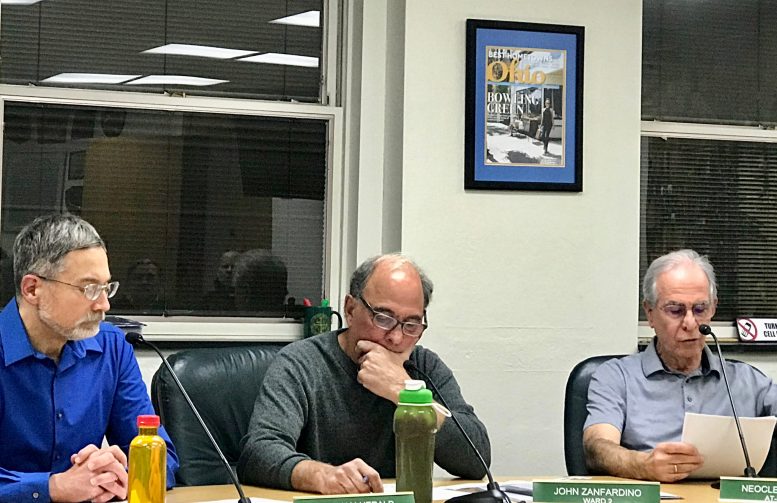By DAVID DUPONT
BG Independent News
The Community Improvement Committee charged with studying the possibility of regulating, licensing and/or inspecting rental units in Bowling Green promised their deliberations will not be for naught.
“I don’t see how we get though this process and have nothing in terms of licensing, regulation and inspection,” William Herald said. Later in the meeting, John Zanfardino who chaired the meeting echoed his sentiments. “Something will come out of this.”
The committee has an April 6 deadline to report back to the full council what their recommendations. On May 4 the entire council will meet to consider the committee’s work.
Zanfardino said: “I’ve felt for quite awhile we need to go forward and look at our housing stock.”
In preparing for the meeting he reviewed the Community Action Plan and the 2014 land use plan.
CZB, the consultants who developed the land use plan, determined that the city’s home owners took a collective $54 million hit in land values because of its lack of housing regulation.
A well maintained owner-occupied home could lose half its value if it had a poorly maintained rental next door.
That report, Zanfardino said, concluded that Bowling Green was a city “in slight decline,” and that decline could be steeper if the housing situation wasn’t address. “They felt the longer we waited to address this and other issues the greater the decline would become.”
Neocles Leontis spelled out the need for licensing, regulation, and inspection. “Those go together,” he said. “You can’t separate them.”
Rental housing is needed as an affordable housing option for families, low-wage workers, and students.
All rental units should comply state and local health and safety standards. Those, he contended, are often not enforced.
“Over time rental housing often deteriorates because of intentional or unintentional neglect of property owners, managers, and tenants,” he said. This creates hazardous conditions and decreases the value of neighboring properties.
The lack of regulation leads some property owners to not make necessary repairs. Tenants may not complain because of lack of knowledge or fear of being evicted.
Many cities, if not most, similar to Bowling Green have such regulations, he said. Those include most college towns, and locally, Maumee and Rossford.
There’s a lot of variation, Leontis said, “because each program is designed for that community.”
Committee members went back and forth in how to structure their meetings.
Leontis said the focus at first should be on those who are key public officials or groups that have studied the issue. In particular he noted the fire chief and the East Side Neighborhood Group.
Zanfardino said he wanted to get the public’s input up front.
They agreed to invite those groups and others to the meeting with the time remaining given to public comment.
Herald noted that property owners should be among those specifically invited. Leontis said not to worry, they would show up.
Vassiliki Leontis said that the committee should reach out to Undergraduate Student Government and Graduate Student Senate for help in soliciting the opinions of student renters who may not be willing or able to come before council, she said.
Herald said the meetings were not the only opportunities for the public to be heard. The city’s website lists their emails and telephone numbers.
As chair, Zanfardino is serving the point person for public requests.
The next two meetings are set for Feb. 4 at 5 p.m. and Feb. 18 at 6 p.m. Committee members also said that a Saturday morning session should be considered.




